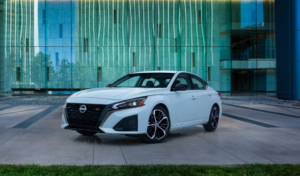The 2025 Nissan Altima Rumor, Specs, Price, and Release Date: The new 2025 Nissan Altima will not be redesigned. Nissan typically produces a new generation […]
Category: Hybrid
Hybrid vehicles have gained significant traction in recent years, offering a compelling alternative to traditional gasoline-powered cars. By combining an internal combustion engine with an electric motor and battery, hybrids provide a harmonious blend of fuel efficiency, reduced emissions, and enhanced performance. In this article, we delve into the world of hybrid vehicles, exploring their benefits, technology, and notable models that are driving the shift toward a greener automotive future.
The Power of Dual Propulsion
At the heart of hybrid vehicles lies their unique powertrain system, which combines the strengths of both gasoline engines and electric motors. The internal combustion engine offers ample power and range, while the electric motor provides instant torque and operates silently, particularly during low-speed driving. The seamless integration of these two power sources allows hybrids to optimize efficiency and performance based on driving conditions.
Fuel Efficiency and Reduced Emissions
One of the primary advantages of hybrid vehicles is their superior fuel efficiency. By utilizing electric power during low-speed and stop-and-go driving, hybrids reduce the reliance on the gasoline engine, resulting in reduced fuel consumption. This not only saves money at the pump but also contributes to a significant reduction in greenhouse gas emissions, promoting a cleaner and more sustainable environment.
Regenerative Braking and Energy Recovery
Hybrid vehicles employ regenerative braking technology, which converts kinetic energy into electrical energy during deceleration and braking. This harvested energy is stored in the vehicle’s battery and can be later utilized to power the electric motor or support the internal combustion engine, further enhancing fuel efficiency. The ability to recover and reuse energy that is typically wasted in conventional vehicles is a key feature that sets hybrids apart.
Hybrid Technology Variants
Hybrid vehicles come in different variants, catering to a range of consumer needs and driving preferences. Full hybrids, such as the Toyota Prius, can operate on electric power alone for short distances and switch seamlessly to the gasoline engine when needed. Plug-in hybrids (PHEVs) offer a larger electric driving range and the ability to recharge the battery by plugging it into an external power source, allowing for extended electric-only driving. Mild hybrids, on the other hand, primarily use the electric motor to assist the internal combustion engine, improving fuel efficiency and reducing emissions.
Notable Hybrid Models
Numerous automakers have embraced hybrid technology, offering an impressive lineup of hybrid vehicles. The Toyota Prius, known for its pioneering role in popularizing hybrids, remains a symbol of fuel efficiency and environmental consciousness. Other notable hybrid models include the Honda Insight, Hyundai Ioniq Hybrid, and the luxurious Lexus RX Hybrid. Luxury automakers such as BMW, Mercedes-Benz, and Porsche have also introduced hybrid variants, combining performance with eco-consciousness.
Conclusion
Hybrid vehicles have emerged as a compelling solution to the challenges of sustainability and fuel efficiency in the automotive industry. By harnessing the power of both internal combustion engines and electric motors, hybrids offer the best of both worlds, providing improved fuel economy, reduced emissions, and enhanced performance. As technology continues to evolve, hybrid vehicles will play a vital role in the transition toward a greener and more sustainable future, shaping the way we drive and preserving the environment for generations to come.

